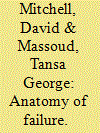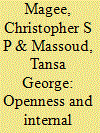| Srl | Item |
| 1 |
ID:
089325


|
|
|
|
|
| Publication |
2009.
|
| Summary/Abstract |
The Bush administration's decision-making process leading to the invasion of Iraq in 2003 has been singled out for its many shortcomings: failure of intelligence; lack of debate concerning options; an insufficient invading force; and poor postwar planning. Contrary to the administration's claim that no one foresaw the difficulties of waging a war in Iraq, many concerns about the challenges the United States would face were raised inside and outside of government. Yet, none of this information had a significant effect on the decision-making process. This paper develops a decision-making model that integrates elements from the individual to the organizational level and explains how important information was marginalized, leading to a poor policy outcome. The model illustrates how the combined effects of the president's formal management style, anticipatory compliance on the part of key players, bureaucratic politics, and the intervening variable of the 9/11 terrorist attacks contributed to a defective decision-making process.
|
|
|
|
|
|
|
|
|
|
|
|
|
|
|
|
| 2 |
ID:
102509


|
|
|
|
|
| Publication |
2011.
|
| Summary/Abstract |
This article examines the relationship between economic openness and internal conflict. The article first discusses different theoretical perspectives on how openness affects a country's internal stability and how internal conflict affects openness. Next, empirical estimates of the relationship between conflict and openness are presented, where conflict is measured with both a civil war dummy variable and an events dataset. The correlation between openness and conflict in the data is negative: more open countries have less internal conflict by some measures. However, internal conflict affects the level of openness, which suggests that openness should be treated as an endogenous variable. When the effect of openness on conflict is estimated using instrumental variables or full information maximum likelihood to control for endogeneity, openness does not significantly reduce internal conflict. There is robust evidence, on the other hand, that conflict within a country reduces its international trade. Together, these results suggest that the negative correlation between openness and conflict emerges because stability facilitates international trade rather than because trade flows reduce internal conflict.
|
|
|
|
|
|
|
|
|
|
|
|
|
|
|
|